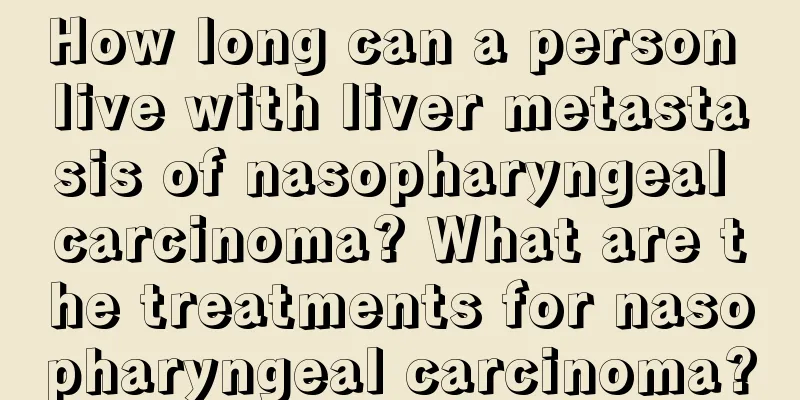What are the characteristics of nasopharyngeal carcinoma metastases to the lymph nodes and how to treat it

|
The symptoms of nasopharyngeal carcinoma are relatively serious, causing dizziness, nosebleeds, etc., and it is easy to metastasize. So what are the characteristics of nasopharyngeal carcinoma metastasizing to the lymph nodes? How to treat it? What are the characteristics of nasopharyngeal carcinoma metastasis to lymph nodes? Characteristics of nasopharyngeal carcinoma metastatic lymphoma: The most typical sites of nasopharyngeal carcinoma metastatic lymphoma are below the earlobe, behind the mandibular angle, and the deep surface of the muscle from the ear to the chest at the neck of the sternocleidomastoid muscle. They are difficult to detect in the early stages of the disease. These lymph nodes can occur alone or in combination with multiple lymph nodes, usually with a diameter of more than 3 cm. Some patients with nasopharyngeal carcinoma metastatic lymphoma are discovered late and have poor lesion activity, which can manifest as enlarged lymph nodes throughout the neck. How to treat nasopharyngeal carcinoma metastases to the lymph nodes? 1. Combination of Chinese and Western cultures The treatment of nasopharyngeal carcinoma in the late stage usually adopts the combination of Chinese and Western medicine. When treating this disease, we should not only consider removing the local cancer of the patient, but also pay attention to systemic treatment to improve the patient's quality of life and prolong the patient's survival. 2. Radiotherapy Since radiotherapy can directly kill cancer cells, patients with advanced disease often choose local radiation, but the premise is that the patient is in good physical condition. The radiotherapy dose, radiation range and radiation course of advanced patients should also be carefully selected according to human body function and the size of the lesion. Generally speaking, combined chemotherapy is one of the common methods for treating patients with advanced nasopharyngeal carcinoma. Radiotherapy is better than simple chemotherapy. 3. Chemotherapy Radiotherapy can be used for patients with advanced nasopharyngeal carcinoma, but radiotherapy lacks selectivity for normal cells, and killing cancer cells will also damage normal cells and impair human functions. Late-stage treatment of the disease is often combined with traditional Chinese medicine to achieve the purpose of improving efficiency and reducing toxicity. Patients with a wide range of metastases and weak bodies should not use radiotherapy and chemotherapy, so conservative traditional Chinese medicine treatment can be chosen. Through the above introduction, we know that nasopharyngeal carcinoma metastasizes to the lymph nodes. If this happens, it is more serious and the patient must receive radiotherapy and chemotherapy to effectively control the disease. |
>>: Is the treatment of advanced nasopharyngeal carcinoma painful? How to take care of it?
Recommend
In life, we must always take precautions against lymphoma
In recent years, the incidence of lymphoma has be...
What is the chance of inheriting fibroids?
What is the chance of fibroids being inherited? I...
Who are the high-risk groups for liver cancer? Eating this kind of food for a long time may cause liver cancer
Long-term consumption of moldy, seaweed-contamina...
How to make persimmon leaf tea
As one of the major producing countries of persim...
How long does it take to see the effect of radiotherapy for small cell lung cancer? Generally it takes about 6 cycles
Small cell lung cancer is such a serious disease ...
Why does it itch when the wound is healing
Many people have encountered this situation: the ...
Why do my hands and feet always sweat
When observing their hands and feet, people may f...
How long does it take for wrinkle removal injections to take effect
Wrinkles are the biggest killer of youthful beaut...
How many days after receiving a cefoperazone can I drink alcohol
"Take Cephalexin and alcohol, and go when yo...
How to cut green onions into shreds
Scallion is an important seasoning in Chinese coo...
What to do if you can't poop
If you have difficulty defecating, you need to ad...
There is a red mark on the chin which does not hurt or itch
According to statistics, about 20% of people have...
What are the symptoms of kidney deficiency? Early detection and early treatment
In daily life, kidney deficiency is one of the is...
Can I eat chicken if I have uterine cancer?
Many patients think that after the operation, the...
Understanding lung cancer pain care through lung cancer cases
The patient, Wang Shuangxi, was 65 years old when...









